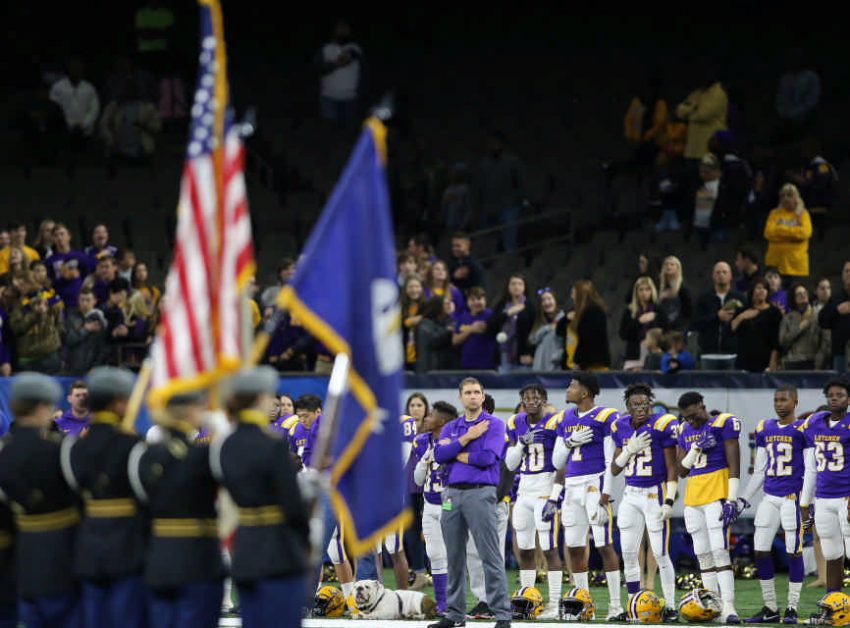Louisiana’s Prepfootballpalooza takes some shine away from state championships

NEW ORLEANS — John Curtis Christian School qualified for a state championship football game by winning two home playoff games.
Hahnville High School also won two home playoff games on its way to a state championship game. But it also had to travel more than 100 miles to get to Acadiana and nearly 300 miles to get to Ruston and win two other football games.
Both Curtis and Hahnville play in Louisiana’s largest classification and will compete for a state title on Saturday in the Mercedes-Benz Superdome.
But they won’t be facing each other or playing for the same prize.
Welcome to Prepfootballpalooza — the farcical three-day, nine-game culmination of the Louisiana high-school football season.
John Curtis plays Catholic High of Baton Rouge at noon Saturday. Approximately seven hours after the winner of that game is handed a trophy as the champion of Louisiana’s highest classification, either Hahnville or Zachary will be handed a different trophy as a different champion in Louisiana’s highest classification.
“We have lost the true state champion,” said John Curtis coach J.T. Curtis, the second-winningest coach in the history of high-school football in the United States. “(After one game) there is going to be a group that says we’re the state champion and (after another game) there’s going to be another group that says we’re the state champion and for the 90 years prior to this that was never a problem.”
This is the fifth year of the select/non-select subdivision of football devised by the Louisiana High School Athletic Association that has gerrymandered the state’s some 300 football-playing schools, more than two-thirds of which are non-select, into five classes and four divisions.
Curtis and Catholic are vying for the Division I “select school” (read: private school) title and Hahnville and Zachary are vying for the Class 5A non-select (read: public school) title.
In short, select schools are those that are able to enroll athletes from outside their geographic region or district, while non-select are those that are unable to do so.
Curtis had a bye as the No. 2 seed, then defeated St. Paul’s and Scotlandville to qualify for the final and get another week off last week. The Patriots have won 26 state championships and, before the split, never reached the final without having to win at least three playoff games. Catholic won three playoff games before its open date last week.
Hahnville and Zachary, on the other hand, got here the old-fashioned way — winning four playoff games each. Hahnville running back Anthony “Pooka” Williams has had a pretty fair season of work in the post-season, rushing for nearly 1,200 yards since the playoffs began. Curtis barely broke a sweat and never left Jefferson Parish.
It’s true that the teams in these two title games, and the other seven, have competed under circumstances similar to those of their respective opponents. But the disparity in the number of teams in a given bracket, the presence or absence of byes and the unequal playoff workload between Division I and Class 5A, which were one and the same five years ago, demonstrate how the current system is a solution in search of a problem.
The football season started on Labor Day weekend and 10 weeks and hundreds of regular-season games later, only 23 percent of the teams were eliminated. The other 77 kept playing.
“We start the season 0-0 and there’s no motivation for the playoffs,” Archbishop Rummel coach Jay Roth said. “It’s done. You’re in.”
Sure, teams’ regular-season records and power points determine the seeds and therefore the relative difficulty of teams’ paths to the Superdome.
“I think the power point system is excellent,” Curtis said. “I think you get the best teams in and I think the teams are seeded appropriately.”
But for most teams, they literally have to do nothing except, avoid probation, I suppose, to qualify for the playoffs. Take Archbishop Shaw, for example. The Eagles have had a very successful program over the years and compete in the storied Catholic League of New Orleans.
They qualified for this year’s playoffs after going 0-10, being shut out four times and being outscored by an average score of 33-6.
“Obviously our playoffs have too many teams that really should not be in the playoffs,” Curtis said without referencing any particular school. “When I say, don’t deserve to be there, I don’t mean from a player standpoint, but from a record standpoint, they have not earned the honor to be in the playoffs.”
But when you have a state with a relatively small population, such as Louisiana, and you have to fill out nine playoff brackets, you have to let in a ridiculous number of teams in order to play enough games to maintain the level of game-day revenue that’s expected.
This split came about because a majority of principals of public schools wanted “a level playing field” against private schools.
Understood.
But everyone doesn’t compete on a level field in every field that can be measured.
Everyone doesn’t have the same quality of facilities or the same enrollment. But those with lesser facilities compete against those with greater facilities.
As for enrollment, some schools choose to “play up” against rival with significantly larger enrollments because they want to compete at the highest level.
Roth praised Orleans Parish public schools that voted against the split, including Karr, which will play Lakeshore for the Class 4A title right after Curtis and Catholic meet in search of its second straight state title.
“The schools in New Orleans never thought things weren’t fair,” Roth said. “They just picked their pants up and worked harder. They don’t have the great facilities, the great turf fields that schools outside of New Orleans have and they are winning state championships.”
Isn’t that why we include athletics as part of the educational experience in the first place? So students can be challenged through competition, so they learn to do their best regardless of what obstacles they encounter?
The value of competition is enhanced when the participants overcome adversity and meet difficult but meaningful challenges head on. That value, though, is diluted when participants qualify for the post-season without winning a game or when the individuals running their schools choose to shield them from difficult but meaningful challenges.
“Sit at home on a Friday in November when your team doesn’t make the playoffs and see if that doesn’t motivate you to work harder to become a better coach or a better player,” Roth said. “That doesn’t happen anymore. As a coach and going back to when I was a player it was, you don’t get what you want, you get what you earn.”
To each of the 18 teams who made it to the Dome, congratulations, you earned it. Nine of you will earn championships.
But somehow those nine championships don’t seem quite as meaningful as five used to.
- < PREV Too many obstacles for Saints to overcome in Atlanta
- NEXT > Catholic-New Iberia exacts sweet revenge, wins Division III state title over Notre Dame
Les East
CCS/SDS/Field Level Media
Les East is a nationally renowned freelance journalist. The New Orleans area native’s blog on SportsNOLA.com was named “Best Sports Blog” in 2016 by the Press Club of New Orleans. For 2013 he was named top sports columnist in the United States by the Society of Professional Journalists. He has since become a valued contributor for CCS. The Jesuit High…






